- Signpost
- Posts
- 🇹🇭 Thailand: Coup (d'état) de grace?
🇹🇭 Thailand: Coup (d'état) de grace?
The power struggle between one family and a national military.

What the media says, what it means, and why it matters.
Was this forwarded to you? Signpost is a free weekly newsletter analysing what the media says, what it means, and why it matters. It’s free to subscribe. Alternatively, you can add me on LinkedIn.
Hi Signposter. Thailand has always been a remarkable destination. In 2024, Bangkok, the capital and largest city, was ranked as the most visited city in the world, welcoming over 32 million tourists. Earlier in 2025, Thailand also became the first country in Southeast Asia, and the second in Asia (after Taiwan), to legalise same-sex marriage. This was after Thailand decriminalised the growing and trading of marijuana and other hemp products in 2022, the only country in the region to do so.
I’ve visited a few times myself, and living in Singapore, it’s a popular place to go for the week to get work done and over the weekend to shop for trendy clothes. That Thailand is an open enough society that attracts all kinds of tourists from around the world is well known. People come to dip their toes in Thailand’s famous beaches, relax at their world class resorts, and gorge on their delicious food. With a tourism-based economy that depends on open and accessible borders, one would expect Thailand to also have a stable government.
Except since 1932, the year when absolute monarchy ended in the country, Thailand has had 13 successful military coups along with several other attempted ones. There have already been two coups this century, and there is a concern that we are at the precipice of one more, which is the focus of this issue of Signpost.
THE STORY SO FAR
📞 Playing Telephone
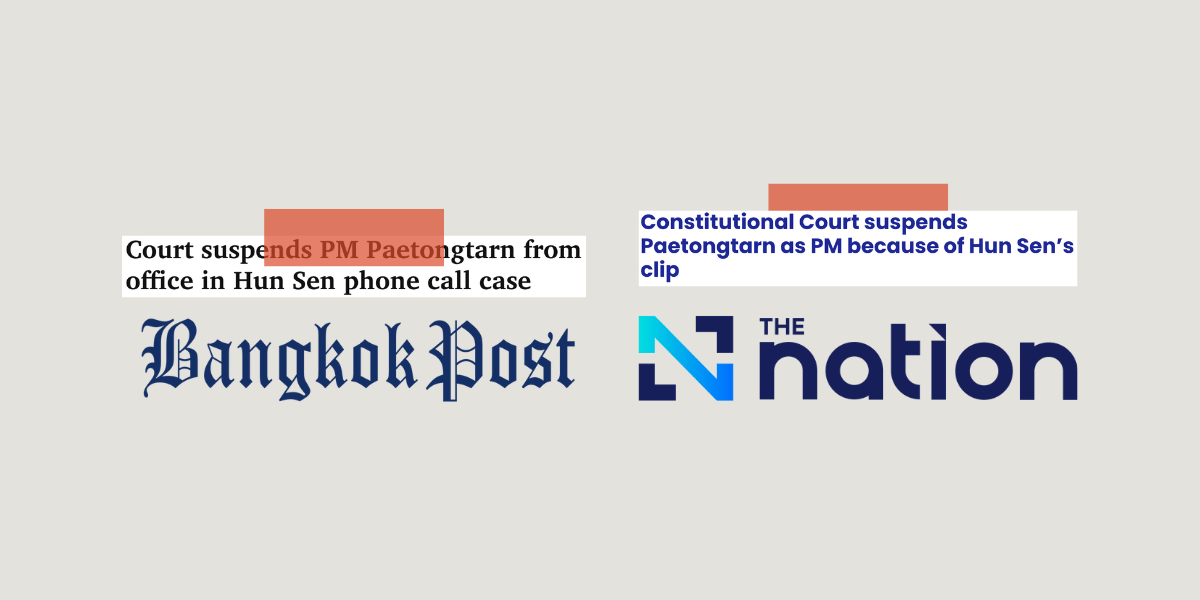
Let’s backtrack for a minute to fully understand what’s going on politically in Thailand.
Since 2024, Thailand has had a prime minister from the Shinawatra family, the second generation leader following in the footsteps of her father (Thaksin) and her aunt (Yingluck). As the third Shinawatra in political office, and only 38 years old, Paetongtarn Shinawatra has been a compromise candidate for the Thai government having led the second largest vote-winning party in the 2023 general election, the Pheu Thai Party (‘The Party for Thai’, founded by her father), and failing to form a coalition partnership with the largest party, the Move Forward Party.
Coming to power officially after the previous prime minister was removed from power a year ago, Shinawatra has since been the premier in Thailand in partnership with the powerful military. Until, that is, last week.
The details are still unclear, but in May a border skirmish between Thailand and Cambodia ended with the death of one Cambodian soldier. The Prime Minister of Cambodia, Hun Manet (himself the son of previous long standing prime minister and current President of the Senate Hun Sen) and Shinawatra were immediately in contact to de-escalate tensions between both countries. Except Cambodia also went to the International Court of Justice to help redraw the border, while Thailand insisted on sorting out this issue between themselves.
This led to Shinawatra speaking to father Hun Sen directly, presumably as a way to bypass son Hun Manet. All seemed fine until it was revealed the Hun Sen was recording the call, and then shared it with his son and other Cambodian officials. This was, in turn, ‘leaked’ to the public.
The contents of the phone call were explosive because Shinawatra crossed a Thai political red line — she criticised her own military general (you get the idea why Thailand has had so many military coups). Which led, ultimately, to protests in Thailand calling for her removal. Last week, she was suspended from her duties.
This issue of Signpost looks at how the news broke in two of Thailand’s largest English news media, Bangkok Post and The Nation Thailand.
HEADLINE NEWS
☎️ BANGKOK POST: Court suspends PM Paetongtarn from office in Hun Sen phone call case [link]
📢 What Bangkok Post is saying
Bangkok Post’s incredibly formal and classical use of English to report the story is as entertaining as it is tedious. There is a lot of time spent on outlining exactly which sections of the Thai constitution Shinawatra violated.
📸 Visuals
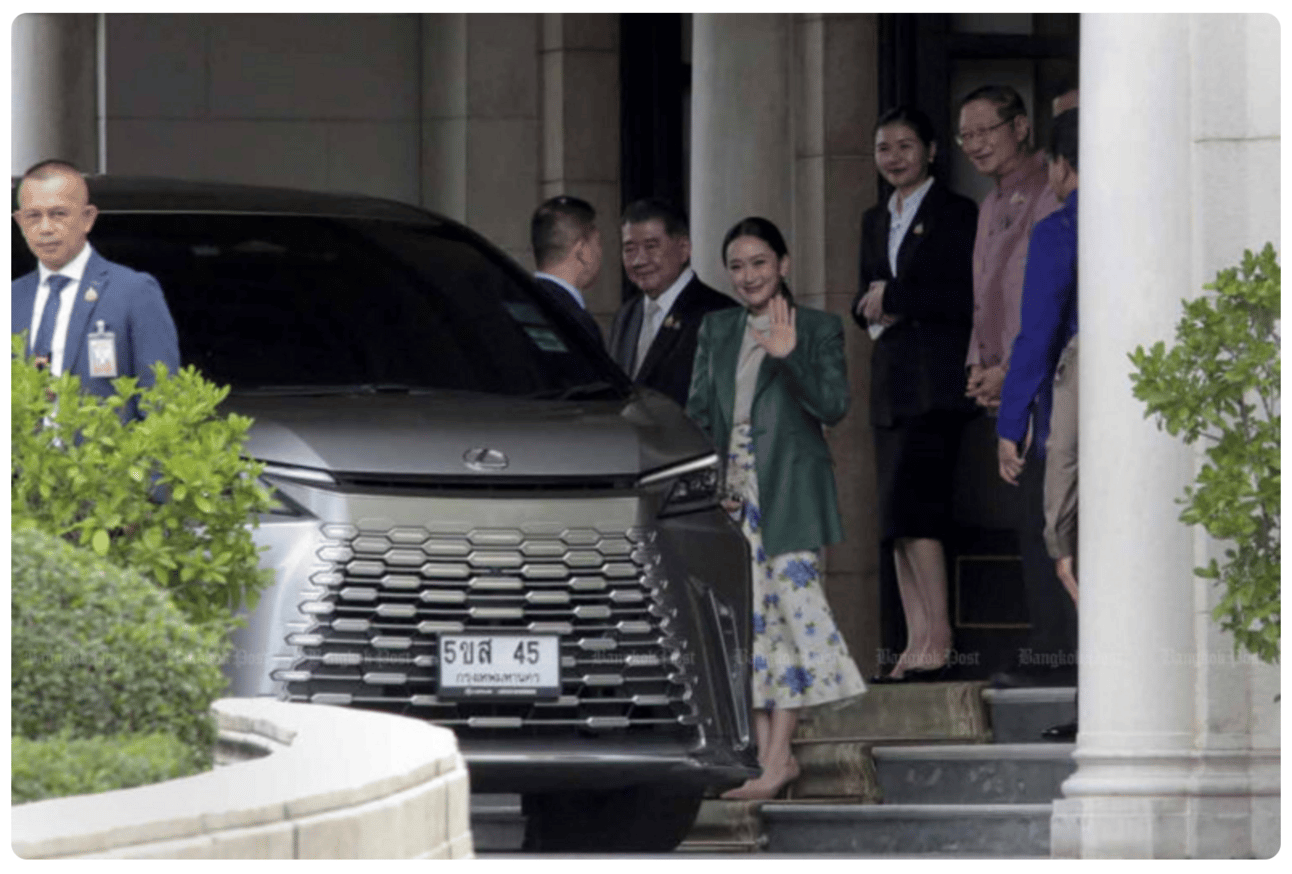
The header image for the article shows Shinawatra descending the steps of Government House in Thailand, flanked by Thai government officials. She is dressed in a green jacket, a white skirt with blue flowers, and a grey top. She is also wearing beige heels. She is looking at and waving (with her left hand) to the camera, smiling as she does. She looks mostly relaxed and pleased. Next to her is a gentleman in a dark suit and light tie, while behind her there are four other people who are also looking relaxed and are smiling. In front of her is a man in a suit, likely the driver of her car.
The car waiting to pick her up is a Lexus, the Lexus LM. A quick Google search of the Lexus Thailand website tells us that it is the ‘flagship MPV’ from the brand, starting from 6,290,000 Thai Baht, or a little more than US$194k (as of writing).
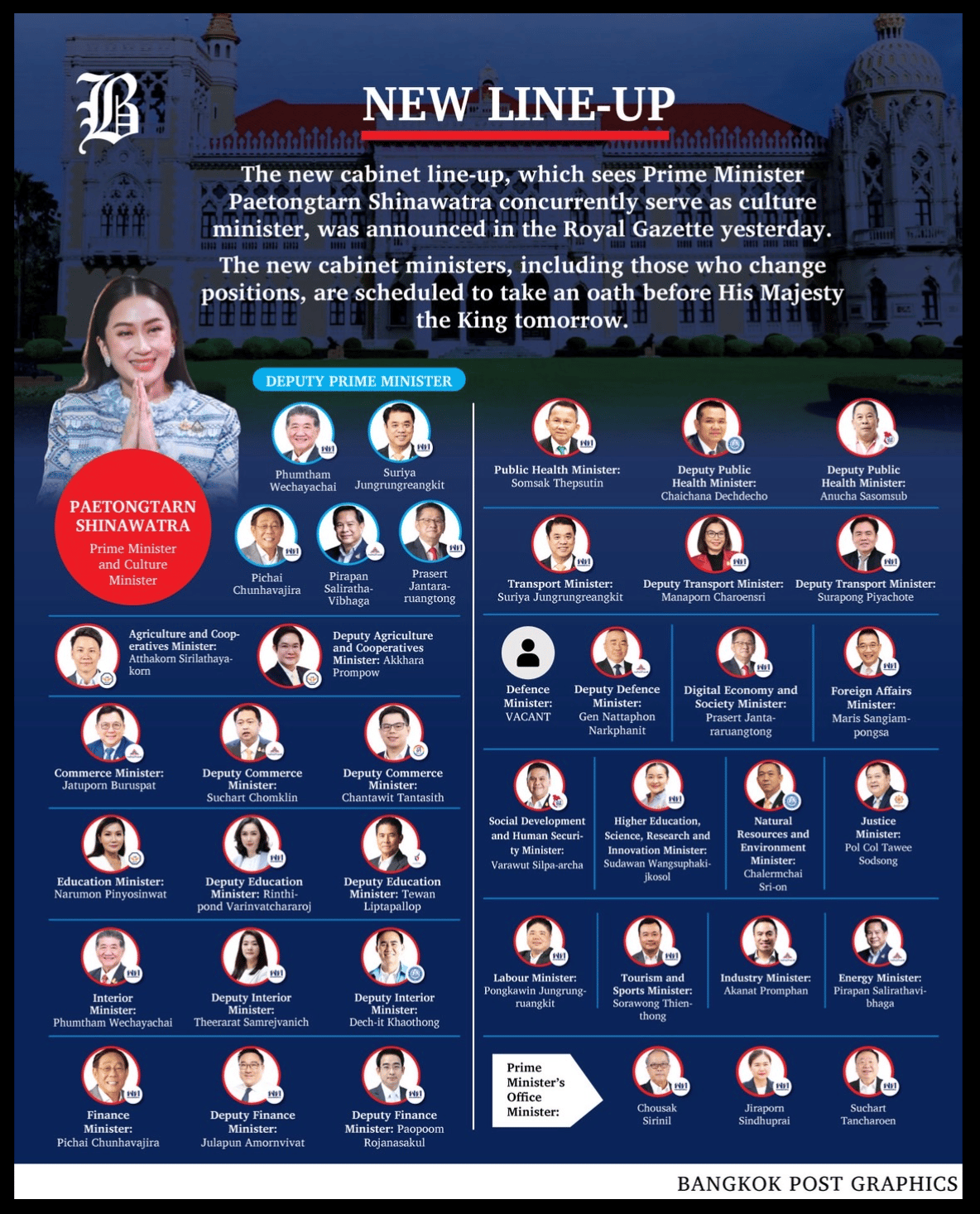
Immediately after the first paragraph of the article, we are greeted with this graphic prepared by Bangkok Post, showing the new cabinet line-up that was confirmed only prior. In it, we see Shinawatra prominently highlighted in red in the upper left hand corner. She is labelled as both Prime Minister and Culture Minister, her dual responsibilities in this new cabinet. She is smiling with her hands together in a traditional Thai greeting.
✍🏽 Words
The headline summarises the situation efficiently, mentioning by name all the major players in the story, including ‘PM Paetongtarn’, and ‘Hun Sen’. The subheading further explains the situation by mentioning the involvement of the ‘courts’, the ‘senators’ petition’, and the new ‘acting PM’.
The article begins by reiterating the situation, though leading with, as in the headline, the ‘Constitutional Court’ who have ‘suspended’ Shinawatra as they consider her ‘controversial phone conversation’ with Hun Sen. The nine judges that voted for her suspension of duties voted ‘seven votes to two’. Shinawatra however ‘remains in cabinet’ because of the previous day’s ‘royal approval of her new cabinet’ where she took on the ‘dual role of minister for culture’.
Here we learn that the ‘petition’ to have her suspended was ‘initiated by 36 senators’ asking to ‘investigate’ her leaked phone call recording with the Cambodian leader. In the call, she was heard ‘making derogatory remarks’ about the ‘commander of the 2nd Army Region, branding him an adversary’, while ‘showing a submissive tone towards Hun Sen’, ready to comply with his demands. Further detail is provided on the 2nd Army, who oversee the Thailand-Cambodia border, including ‘four contested areas’ that seemingly kicked off this skirmish.
The article then outlines all the sections of the constitution that she has been accused of violating by the Constitutional Court (I will not repeat them here because it is incredibly tedious). Finally, a response from Shinawatra is published, saying she initially contacted the Cambodian leader to ‘prevent more clashes’, including that she had “no ill intentions” and that she apologises for her behaviour if it was “unsatisfactory to many people”.
❓ What it means
The reporting of this news is so sterile that it’s unnatural. The suspension of a prime minister from power is a remarkably high stakes issue that is, perhaps deliberately, being downplayed here. However, we do get an inkling into the various power levers in Thai politics through this story.
Let’s consider both the 36 senators who lobbied for the investigation and the suspension of Shinawatra from her prime ministerial duties, and the Constitutional Court who agreed to said suspension. The question in this case is who does the Court report to? I can only guess it’s to the people who felt most undone by Shinawatra’s statements — the military.
⚠️ Why it matters
Thaksin Shinawatra was famously deposed from his prime ministerial role through a military coup, spending years in exile (where he ended up buying Manchester City Football Club in England before selling it to the Emiratis) before returning to Thailand in 2023 under what is considered to be a deal that his daughter Paetongtarn Shinawatra, the current suspended prime minister, negotiated.
Yingluck Shinawatra, Thaksin’s younger sister and Paetongtarn’s aunt, was not only the first female prime minister of Thailand, she was also the youngest at that time. Her prime minister-ship also came to a close in 2014 due to a military coup. And now, in 2025, we are seeing the reboot of the same story.
⏸️ THE NATION THAILAND: Constitutional Court suspends Paetongtarn as PM because of Hun Sen’s clip [link]
📢 What The Nation Thailand is saying
The language used in the reporting of this story by The Nation Thailand is a lot more in line with contemporary journalistic standards. Similarly, there is a lot more information in the article regarding the charges against Shinawatra and her response to these charges since her suspension.
📸 Visuals
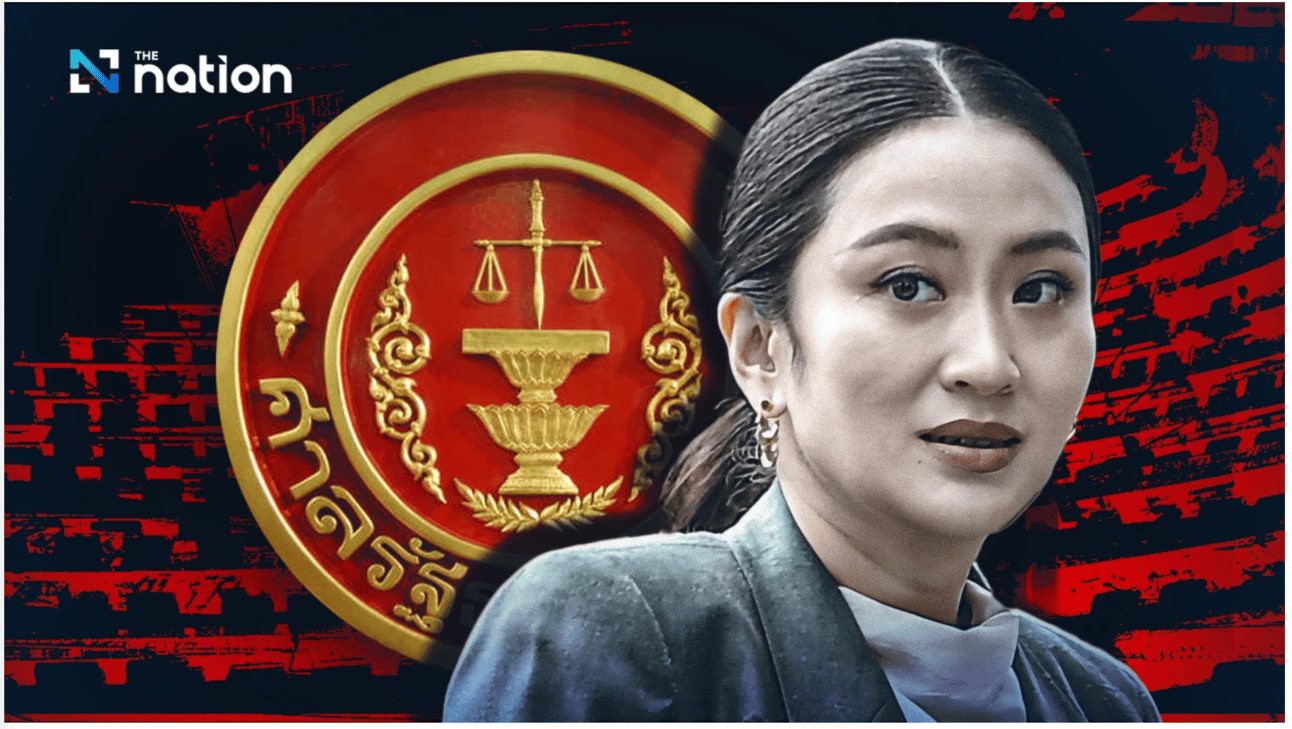
There is only one visual used in this article, and it is a graphic prepared by the newspaper. In it, we see the face and shoulders of Paetongtarn Shinawatra looking neutral, if not a bit concerned, set against a dark red and black background. She is wearing a grey jacket and a light top, her hair pulled back in a ponytail with a gold earring showing in her right ear.
In the background behind her is the seal of the Constitutional Court of Thailand shown in red and gold, which itself is offset against a background of what looks like a heavily edited and high contrast image of the Thai parliament. The seats are blacked out while the spaces between are highlighted in a bright red. It is obvious that this is a picture to indicate trouble.
✍🏽 Words
The headline summarises the situation, leading once again with the Constitutional Court, before naming all the parties tied to this situation. The summary sentence mentioned first in the article includes the detail that Shinawatra will remain ‘as culture minister’. In the article proper, we hear about the ‘leaked audio clip’ that led to her suspension, voted on by ‘nine’ judges, who had accepted ‘the petition of 36 senators, which had been forwarded to the court’ by the Speaker. Even though the judges voted ‘7-2’ to suspend Shinawatra’s ‘duties as prime minister’, she can ‘still function as culture minister in her new Cabinet’, a post ‘she had nominated herself for’ which had been ‘signed by the King’ just before the court’s decision.
Her accusers accuse her of ‘sedition’, especially because she was heard on the leaked phone call calling the Thai military commander involved in the border skirmish as “the opponent”, who were, in turn, taking ‘a tougher stance’ defending the Thai border. While the court has ordered her to ‘submit her written defence’ in 15 days time, she must ‘stop working as prime minister’ from 1st July onwards.
Here, oddly, we get the names of the two judges who voted against her suspension. Their reason? They weren’t sure if she had ‘violated the charter’. The accusation from the senators also included Shinawatra having ‘personal ties’ with the Cambodian leader, which they claim led to secret negotiations between the two to the detriment of Thailand. Further, the senators dismissed her explanation following the leak as ‘unreasonable’, even though Shinawatra herself insisted that her ‘private conversation should not have been made public’. The final claim from the senators was that she should have ‘tried to resolve the border situation through systematic methods and diplomatic negotiations’, further stating that ‘there was no reason for Paetongtarn to hold a secret and personal conversation with Hun Sen’, nor was there any reason for her to call him “uncle” and the Thai commander “the other side”.
❓ What it means
We get some more details of what the specific accusations were that led to the suspension of the prime minister, but once again there’s not a lot of response from Shinawatra to the accusations. However, even though the article makes clear the issues raised by the senators, it makes clear very early on that Shinawatra is still in the cabinet, just temporarily dismissed as the prime minister.
The timing of her appointment as culture minister alongside her prime ministerial duties is circumspect. The fact that the cabinet has the King’s approval, arguably the highest law in the land, and landed mere moments before the Constitutional Court issued it’s verdict, does make it seem like there is a bit of political theatre at play. Perhaps a coup is unlikely?
⚠️ Why it matters
It is hard to imagine that such dismissals happen without the express will of the King. And by providing Shinawatra a space to defend herself in 15 days time, while also allowing her to continue her duties as a culture minister feels like the royal military is not actively looking to ostracise her. The perception is that this is the various steps to be taken to discipline her, but not to remove her. Clearly, there is still some value that the powers-that-be have in keeping the Shinawatra clan close, than to simply exile them as they did with her father.
Why? It’s hard to say. It does seem unlikely that the Shinawatra’s have some kind of trump card that keeps them from being removed from power as they were previously. Perhaps the military is aware that removing a Shinawatra doesn’t necessarily remove a Shinawatra from Thai politics. Let’s also not forget that the party of the Shinawatras is not the largest party in the Thai lower house of parliament. That award, by a razor thin margin, goes to the progressive People’s Party, who are pushing for more democratic, constitutional and legislative change in Thailand. Should the Shinawatras’ Pheu Thai Party no longer be able to form a government, what will that mean for the distribution of power between the military and more progressive political forces?
WHAT’S GOING ON?
🗳️ What about the people?
There are a few key similarities between how both news media reported the news. First, both media referred to her a Paetongtarn, which is her first name, rather than Shinawatra, which is her family name. This, however, is easily explained as part of Thai linguistic culture which usually uses the first name with an honourific instead of the last name which is a more formal English language approach. However, the only honourific used by both news media, and not consistently, is PM. She is mostly referred to, quite casually, by simply her first name.
Next, both news media do not name the 36 senators who lobbied for Shinawatra’s investigation and suspension, nor do we get the names of the seven judges who voted to suspend her from power. Instead, we get the names of the two judges who voted in her favour in The Nation Thailand.
Finally, both news media do not include any expert opinions, input from citizens, or statements from the protesters who were supposedly protesting for Shinawatra’s suspension. All this asks the question, what do the people of Thailand want?
Presumably, the results of the previous election and the vote share and seats won by the People’s Party (previously called Future Forward Party, followed by Move Forward Party) give us an inclination of what the temperature of the electorate is. As the current largest party and main opposition party in parliament, one can say that a significant section of Thai voters are looking for more progressive legislation in parliament.
Thailand also famously grappled with anti-government protests in 2020 which then evolved into protests to reform the Thai monarchy. That, somehow, led to the dissolution of the Future Forward Party and the rehabilitation of the Shinawatras back into power.
Does this suspension from power mean the Shinawatras return to Thai politics has ended before it barely began? Does this clear the path for more progressive parties in Thailand to come to power? Or is this merely political theatre dressed up as safeguarding political standards?
The truth, as always, is somewhere in between.
Read widely. Question thoroughly. Decide accordingly.
WEEKLY POLL
LAST WEEK’S POLL
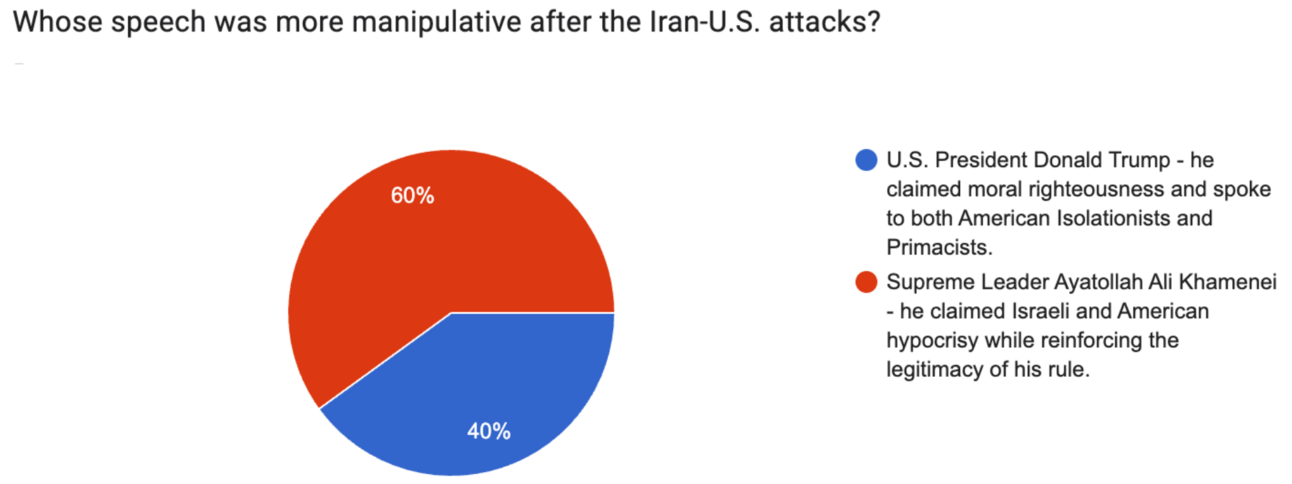
ALSO THIS WEEK
On the 90th birthday of the Dalai Lama, His Holiness confirmed a (yet to be named) successor, leading to conflicting messages from China (which claims sovereignty over Tibet) and India (where the current Dalai Lama lives).
Was this forwarded to you? Signpost is a free weekly newsletter analysing what the media says, what it means, and why it matters. It’s free to subscribe. Alternatively, you can add me on LinkedIn.

